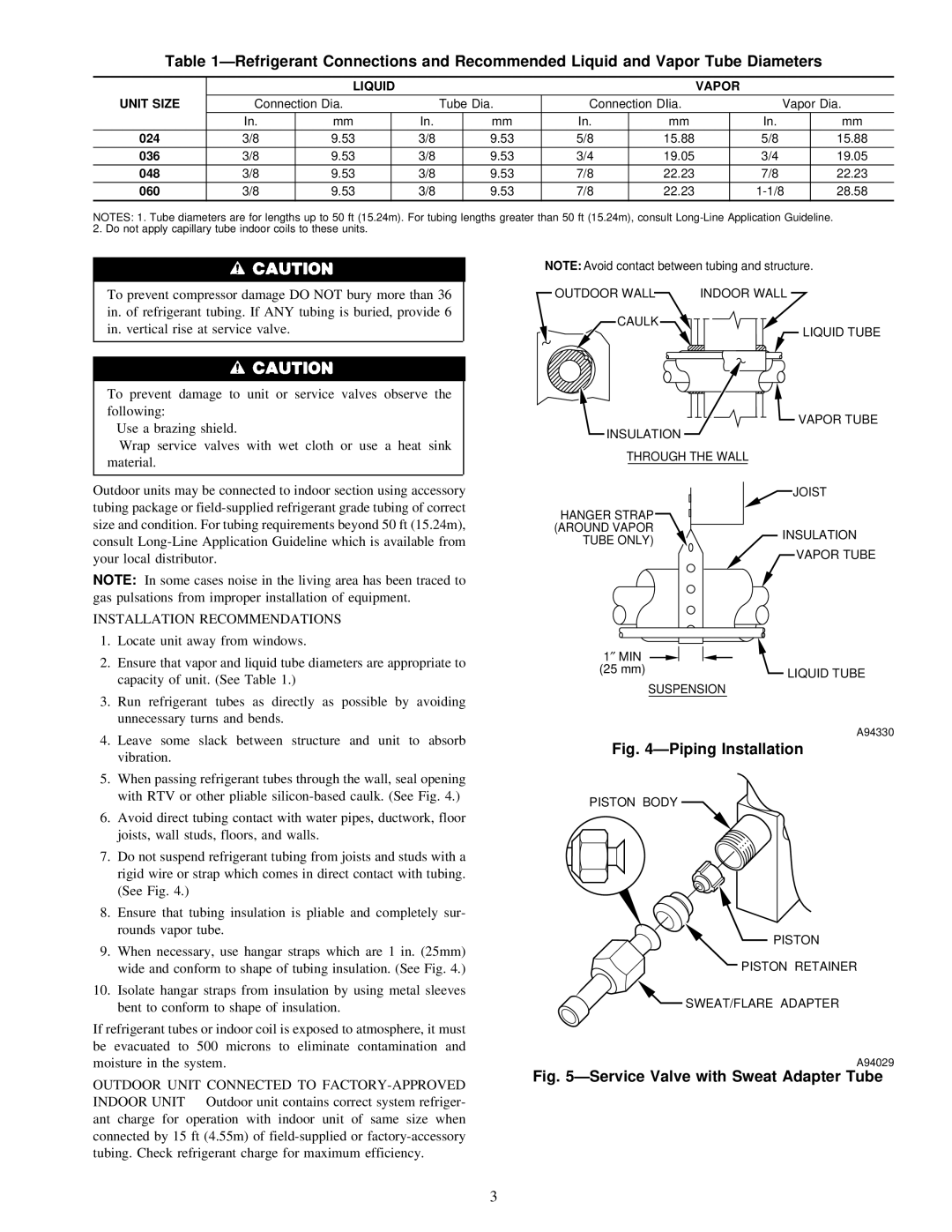
Table
|
| LIQUID |
|
|
|
|
| VAPOR |
| ||
UNIT SIZE | Connection Dia. |
| Tube Dia. | Connection DIia. |
| Vapor Dia. | |||||
| In. | mm |
| In. |
| mm | In. | mm |
| In. | mm |
024 | 3/8 | 9.53 |
| 3/8 |
| 9.53 | 5/8 | 15.88 |
| 5/8 | 15.88 |
036 | 3/8 | 9.53 |
| 3/8 |
| 9.53 | 3/4 | 19.05 |
| 3/4 | 19.05 |
048 | 3/8 | 9.53 |
| 3/8 |
| 9.53 | 7/8 | 22.23 |
| 7/8 | 22.23 |
060 | 3/8 | 9.53 |
| 3/8 |
| 9.53 | 7/8 | 22.23 |
| 28.58 | |
NOTES: 1. Tube diameters are for lengths up to 50 ft (15.24m). For tubing lengths greater than 50 ft (15.24m), consult
To prevent compressor damage DO NOT bury more than 36 in. of refrigerant tubing. If ANY tubing is buried, provide 6 in. vertical rise at service valve.
To prevent damage to unit or service valves observe the following:
•Use a brazing shield.
•Wrap service valves with wet cloth or use a heat sink material.
Outdoor units may be connected to indoor section using accessory tubing package or
NOTE: In some cases noise in the living area has been traced to gas pulsations from improper installation of equipment.
INSTALLATION RECOMMENDATIONS
1.Locate unit away from windows.
2.Ensure that vapor and liquid tube diameters are appropriate to capacity of unit. (See Table 1.)
3.Run refrigerant tubes as directly as possible by avoiding unnecessary turns and bends.
4.Leave some slack between structure and unit to absorb vibration.
5.When passing refrigerant tubes through the wall, seal opening with RTV or other pliable
6.Avoid direct tubing contact with water pipes, ductwork, floor joists, wall studs, floors, and walls.
7.Do not suspend refrigerant tubing from joists and studs with a rigid wire or strap which comes in direct contact with tubing. (See Fig. 4.)
8.Ensure that tubing insulation is pliable and completely sur- rounds vapor tube.
9.When necessary, use hangar straps which are 1 in. (25mm) wide and conform to shape of tubing insulation. (See Fig. 4.)
10.Isolate hangar straps from insulation by using metal sleeves bent to conform to shape of insulation.
If refrigerant tubes or indoor coil is exposed to atmosphere, it must be evacuated to 500 microns to eliminate contamination and moisture in the system.
OUTDOOR UNIT CONNECTED TO
NOTE: Avoid contact between tubing and structure.
OUTDOOR WALL INDOOR WALL
CAULK
![]() LIQUID TUBE
LIQUID TUBE
VAPOR TUBE
INSULATION
THROUGH THE WALL
JOIST
HANGER STRAP
(AROUND VAPOR
TUBE ONLY)INSULATION VAPOR TUBE
1″ MIN |
|
|
|
|
|
|
|
|
|
|
|
|
|
| |
(25 mm) |
|
|
|
|
|
| LIQUID TUBE |
|
|
|
|
|
|
| |
| SUSPENSION | ||||||
A94330
Fig. 4—Piping Installation
PISTON BODY![]()
PISTON
PISTON RETAINER
![]() SWEAT/FLARE ADAPTER
SWEAT/FLARE ADAPTER
A94029
Fig. 5—Service Valve with Sweat Adapter Tube
3
